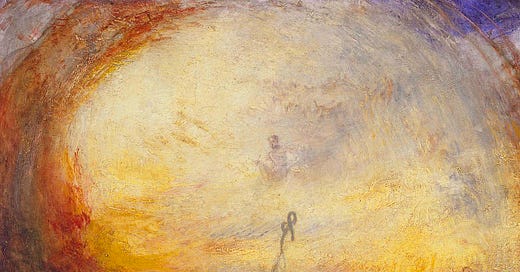Brain Food #858: Alchemy, resonance, and the difference between positive and magical thinking
Between the longing and the arrival, our thinking shapes our experience
“Mountains and thunderous rivers belong to a few cells in my brain, or to some corner of paradise.
Tonight, for the first time in my own experience of this harbour in Brittany, a large band of fog from west to east underlines the horizon... I must have been homesick for fog, and it arrived!”
— Etel Adnan
Often, what we yearn for can be as ungraspable as fog. Between the longing and the arrival, our thinking shapes our experience. Lately, I have been reflecting on the difference between magical thinking and positive thinking. One relies on the power of belief alone to influence outcomes. The other believes that whatever happens, we still have the sole thing that distinguishes humans from other beings: the agency to shape our responses and choose our actions.
In magical thinking, we believe our longing for something can magically produce the very thing we have longed for. It implies a form of alchemy, in which our thoughts meet the world and, as a result, change our circumstances. Magical thinking is largely based on assumptions; by thinking something we can make it so, as Paulo Coelho perhaps suggested in The Alchemist when he wrote, “If you really want something to happen, the whole universe will conspire in your favour.”
Though it can have value by serving as a defence or coping mechanism for uncertainty, magical thinking’s overreliance on the power of thought alone can also lead to inaction.
Positive thinking is more closely related to having faith in the actions of the world and our actions in it—relinquishing control while still believing something positive might come along, and being receptive to whatever does.
In The Uncontrollability of the World, German sociologist Hartmut Rosa talks about feeling alive as a resonance between ourselves and the world. Where or how that resonance comes about is not up to us:
“Whether resonance occurs or what its result might be remains uncontrollably open. In my view, this kind of relatedness forms the basis of the practice of prayer, which cannot be understood otherwise. In contrast to what happens in the practices of alchemy or magic, in prayer there is no attempt to manipulate the other side or to engineer a particular result. The aim is rather to feel or sense an accommodating response, the content of which is not predetermined. […] In sociological terms, this means that resonance always has the character of a gift, of something that is bestowed upon or befalls us.”
Resonance, however, is not always gentle. As glass can teach us, when the resonance is too loud, it can lead to breaking. Positive thinking does not imply that wonderful things keep happening, only that the nuisances may no longer look like ‘bad signs,’ but as natural parts of being.
Alchemy turns base metals into gold. Positive thinking is more like kintsugi—you take the gold and fill the cracks.
Where positive thinking is a relation between our internal world and external events, magical thinking is an event that can perhaps lead to internal alchemy: when we have looked at the cracks within enough that we are finally able to change them. For Carl Jung, alchemy was a way of changing our relationship with ourselves: “Only after I had familiarised myself with alchemy did I realize that the unconscious is a process, and that the psyche is transformed or developed by the relationship of the ego to the contents of the unconscious.”
In The Odyssey, the word ‘nostos’ refers to Odysseus’ journey home. Nostalgia is the combination of nostos (return) and algos (pain). All of longing is a form of homesickness turned into homecoming. The experience of how we get there largely relies on our thinking, and how we deal with the obstacles that appear along the way.
Resistance to positive thinking might be resistance to trying. The belief in the possibility leads to action, for without action we live in our thoughts, and the danger of thinking one thing and doing another. As Johann Wolfgang von Goethe said, “How can a man come to know himself? Never by thinking, but by doing.” That is why they say that every moment we spend on one activity is a moment not spent on something else. Piece by piece, moment by moment, a life gets created. And as action meets hope, we find our way through the fog.
“There are no / empty hopes. But knowing / what to hope for is steady / work”
— Joanna Klink




You always have the best timing! I have been thinking about magical thinking ever since I read Joan Didion’s book and of late, I am so aware of using this to mentally survive. Your beautiful piece helped me see more deeply.